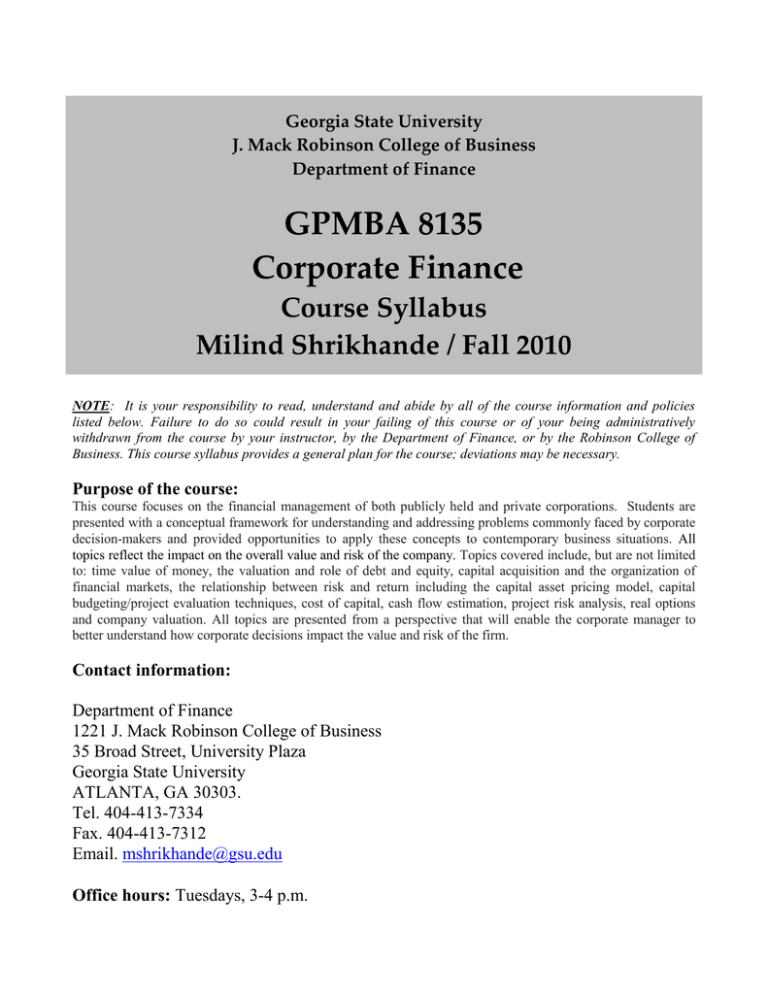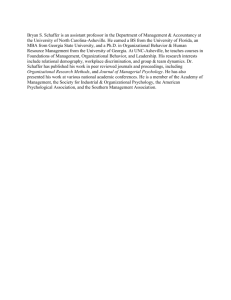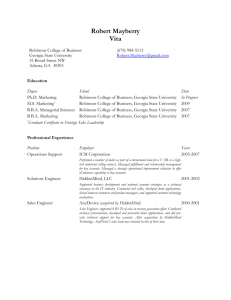Course Syllabus - Georgia State University
advertisement

Georgia State University J. Mack Robinson College of Business Department of Finance GPMBA 8135 Corporate Finance Course Syllabus Milind Shrikhande / Fall 2010 NOTE: It is your responsibility to read, understand and abide by all of the course information and policies listed below. Failure to do so could result in your failing of this course or of your being administratively withdrawn from the course by your instructor, by the Department of Finance, or by the Robinson College of Business. This course syllabus provides a general plan for the course; deviations may be necessary. Purpose of the course: This course focuses on the financial management of both publicly held and private corporations. Students are presented with a conceptual framework for understanding and addressing problems commonly faced by corporate decision-makers and provided opportunities to apply these concepts to contemporary business situations. All topics reflect the impact on the overall value and risk of the company. Topics covered include, but are not limited to: time value of money, the valuation and role of debt and equity, capital acquisition and the organization of financial markets, the relationship between risk and return including the capital asset pricing model, capital budgeting/project evaluation techniques, cost of capital, cash flow estimation, project risk analysis, real options and company valuation. All topics are presented from a perspective that will enable the corporate manager to better understand how corporate decisions impact the value and risk of the firm. Contact information: Department of Finance 1221 J. Mack Robinson College of Business 35 Broad Street, University Plaza Georgia State University ATLANTA, GA 30303. Tel. 404-413-7334 Fax. 404-413-7312 Email. mshrikhande@gsu.edu Office hours: Tuesdays, 3-4 p.m. Georgia State University A. MBA 8135: Corporate Finance COURSE MATERIAL Required Text: Corporate Finance: A Focused Approach, by Michael C. Ehrhardt / Eugene F. Brigham, Thomson South-Western, 4th ed. 2010. Additional student resource material can be found on the publisher’s website at: http://ehrhardt.swlearning.com. Financial Calculator: It is necessary that you have a financial calculator to use throughout the course and that you bring it to class each Week. Many end-of-chapter problems require complex arithmetic operations, and a financial calculator is necessary to solve these problems efficiently. Recommended financial calculators are the Texas Instruments BA II Plus, the Hewlett Packard 10B or 12C, the Sharp EL 733, and similar models. Approximate price: $30. B. ATTENDANCE POLICY / ACADEMIC HONESTY Attendance Policy: Each student is expected to attend ALL scheduled class meetings for the entire duration of the class meeting. An attendance sign-up sheet will be circulated each class period. It is your responsibility to sign the attendance sheet. If you do not sign the list, you will be considered absent (see the note on academic honesty below). Students arriving late may be permitted to sign the sheet only at the discretion of the instructor. Any student who is absent from more than the equivalent of three classes will be dropped from the course. Absences include the first week of class regardless of when a student registered for the course. If a student is withdrawn for excessive absences after the midpoint of the grading period, a final grade of WF will be assigned. There will be no exceptions to this policy! An absence from class for any reason (job conflict, illness, appearance in court, transportation problems, etc.), even if permitted and/or excused by your instructor, will count as one of the class absences against the three class cumulative limit specified in the previous paragraph. Students who wish to request accommodation for a disability may do so by registering with the Office of Disability Services. Students may only be accommodated upon issuance by the Office of Disability Services of a signed Accommodation Plan and are responsible for providing a copy of that plan to the Global Partners administration and indicate all classes in which an accommodation is sought. -2- Georgia State University MBA 8135: Corporate Finance Academic Honesty: The Department of Finance adheres strictly to the University's policy on academic honesty as contained in the Academic Regulations section of the University catalog. Any student found copying during exams or quizzes, signing someone else's name to the attendance list, using stored formulas in programmable calculators, using nonauthorized formula sheets or other notes during exams, collaborating on and/or copying any in-class or take-home assignments, or the like will receive an F for the course and possibly be subject to additional University disciplinary action. No other electronic devices are allowed during quizzes and exams besides a financial calculator (see page 2). Such prohibited items include laptops, personal digital assistants (PDA’s), text messaging systems and similar devices. If you have any questions about the legality of your calculator, check with your instructor. C. IMPORTANT COURSE INFORMATION AND POLICIES Grade Weights: Mid-term exam Group assignments (3), quizzes (2) Final exam 25% 45% 30% All course grades, once assigned, are final and cannot be changed except in the rare event of a mathematical miscalculation by the instructor. Grading Policy - Department of Finance: In accordance with Departmental policy, for masters level courses (MBA and FI prefixed), it is expected that no more than 35 percent of the students in a given class section will receive a grade of A. The majority of the remaining students are expected to receive grades of B. Those students demonstrating significantly lagging performance shall earn grades of C or lower as appropriate. The finance department employs the +/- grading system. A C- is considered a passing grade for this course and a C- is considered passing for prerequisite purposes for this course as well as for all finance electives. Refer to the University catalog for information concerning +/- grading and quality points for GPA calculations. Course evaluation: Your constructive assessment of this course plays an indispensable role in shaping education for the Global Partners MBA program. Upon completing the course, please take time to complete the online course evaluation. -3- Georgia State University D. MBA 8135: Corporate Finance DETAILED COURSE SCHEDULE OUTLINE Class # 1 (10/14) 2 (10/21) Topics to be covered An Overview of Finance Goal of Financial Management Financial Markets and the Cost of Money Assignments, Quizzes, Exams Read Course Syllabus Read Chapter 1 Group-Assignment 1 Time Value of Money - Part I FV/PV of Single-Period Cash Flows FV/PV of Multi-Period Cash Flows Read Calculator Handbook Read Chapter 4 Time Value of Money – Part II Multiple Compounding and Discounting Amortized Loans Chapter 4 continued Quiz-1 Financial Statements and Cash Flows Analysis of Financial Statements Read Chapter 2 & 3 3 (11/04) Bonds and Their Valuation Key Characteristics of Bonds Bond Valuation and Bond Yields Read Chapter 5 Group-Assignment 2 4 (11/11) Risk and Return Risk in a Portfolio Context Beta and the CAPM Read Chapter 6 Mid-term exam Stocks and Their Valuation Common Stock Characteristics Stock Valuation and Stock Market Equilibrium Read Chapter 7 Financial Options Option Terminology Option Price Relationships and Option Pricing Read Course Syllabus Read Chapter 8 The Cost of Capital Cost of Debt Cost of Equity Weighted Average Cost of Capital Read Chapter 9 Group-Assignment 3 The Basics of Capital Budgeting Different Methods of Evaluation Unequal Lives and Economic Life Read Chapter 10 Quiz-2 Cash Flow Estimation Simple Project Analysis Read Chapter 11 5 (11/18) 6 (12/02) 7 (12/09) Review Final exam Bio-sketch -4- Georgia State University MBA 8135: Corporate Finance Milind M. Shrikhande Associate Professor of Finance Department of Finance EDUCATION: Chartered Financial Analyst (CFA) Ph.D., University of Pennsylvania, The Wharton School M.A., University of Pennsylvania, The Wharton School M.B.A., Indian Institute of Management, Calcutta B.Tech., Indian Institute of Technology, Bombay SPECIALIZATIONS: Corporate Governance Asset Pricing International Finance Corporate Finance Prior to joining Georgia State University, Dr. Milind Shrikhande has worked at Georgia Tech, Unilever, and the World Bank. He was nominated for excellence in teaching at the Institute level at Georgia Tech’s DuPree College of Business, and also won the Best Research Paper Award at the Global Finance Conference. He was awarded the First Harvey Brightman Award for teaching innovation at the J. Mack Robinson College of Business in 2006, and GSU’s Instructional Effectiveness Award in 2007. His research has been published in the Review of Financial Studies journal. He has also published his research in European Financial Management, Journal of International Financial Management and Accounting, as well as the Journal of Multinational Financial Management. He directs the MS-Finance program at Georgia State University, and is a Visiting Scholar at the Federal Reserve Bank of Atlanta. -5- Georgia State University MBA 8135: Corporate Finance -6-




